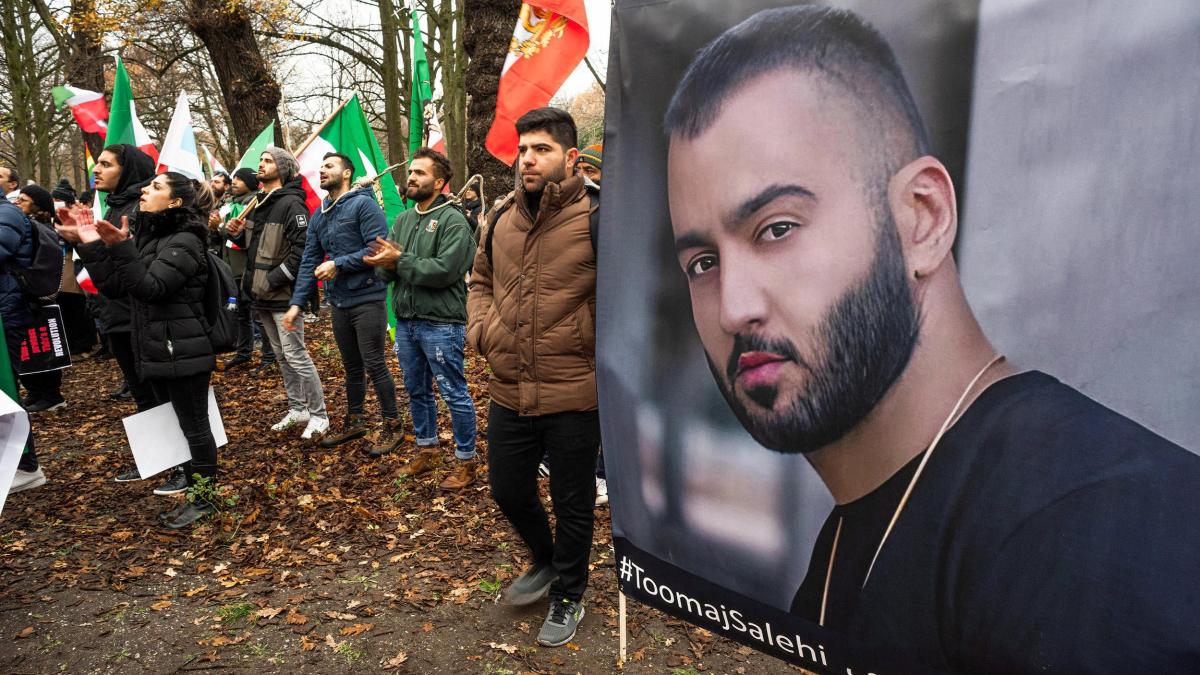Er is one of the most famous rappers in Iran. And now probably worldwide. It was his fate, his story, that has moved people like no other in recent months. Not only because it no longer shows any trace of humanity to keep a young person in solitary confinement for months for his song lines, to expose him to the worst torture. But because that very person was so prophetic in the practice of this very art.
In his music videos he already showed himself as a tortured political prisoner, he predicted that an example would be made of him. It can be assumed that he will remain scarred by the consequences of the actual torture, so brutal was the action taken against him. His family is cautious, but let it be known: Toomaj can no longer walk properly, his hands have been broken several times and one of his eyes is probably permanently damaged.
“FreeToomaj” is not just a hashtag. In the past week alone, it has been shared hundreds of thousands of times. It has become a household word and stands for all the others in Iranian prisons who shouldn’t be there. Over 20,000 people were detained as political prisoners during the protests. Many of them like Toomaj young people.
They drove the movement with their vehemence and courage, with their sense of social justice and diversity. Under the eyes of this fascinated public, however, she was intimidated in the most brutal way. For a dance: to prison. For a TikTok video: to jail. For asking about a detained protester: to jail.
From the beginning there were deaths. 520 so far. Only a few days after Jina Mahsa Amini’s death, Sarina Esmailzadeh was found dead. She is said to have thrown herself from a house. Say the security forces. She died from severe blows to the head, an NGO says. Then came the executions, no, a wave of executions in which Iran executed one person every six hours. Court Proceedings Without Legal Aid. All of this is for maximum deterrence. And that’s how the case of Toomaj Salehi has to be read. On Twitter one reads: Toomaj Salehi is the red line of the Iranian nation.
Next to him – or against
The 33-year-old rapper had his second and final court hearing on July 2. His lawyer, Amir Raisian, is said to have had less than 30 minutes to address the charges, some of which carry the death penalty. Among them Mofsed-e-filarz, the “corruption on earth”, the undermining of the divine order. It’s one of the charges most commonly leveled against those unloved by the regime — to silence them with a thoroughly mundane pretension. Oppositionists, artists, religious minorities. ‘Corruption on earth’ carries the death penalty.
Other allegations against Salehi include inciting riots, propaganda against the system and collaborating with a foreign government. The prosecution said they could prove the latter based on an interview that Salehi gave to the Canadian broadcaster CBC at the end of October 2022. Salehi had previously been a prominent dissident, and in his songs he criticized corruption – in this case: venality and nepotism – and social injustices against minorities in Iran.
Speaking to CBC, Salehi condemned the actions of the security forces against the protesters, explaining that it was about not being dispersed. And he said that whoever does not stand with him in this movement, stand against it. Salehi joined the protests after the death of Kurd Jina Mahsa Amini early on, posting videos and music.
Nahayat Tizhoosh is the journalist who interviewed Toomaj Salehi. It was not only the first time he had been seen in a medium like this, but also the last. Only a few days after publication, in early November, Salehi was arrested and has been in solitary confinement ever since.
“The regime fears nothing more than that the protests will flare up again. So on a case like Toomaj, they show everything they’re capable of,” says Tizhoosh. On the one hand, this includes the great hardness and brutality. But also arbitrariness. Just days after the final day of the trial, the pro-government Tasnim News Agency reported that Toomaj Salehi does not face the death penalty, only imprisonment.
“Without the judgment of the judge, there can be no news at all,” Tizhoosh said. “It shows the psychological games that the regime plays with the population.” Because the Tasnim article justified this departure from the death penalty with an alleged cooperation of the rapper with the court.
Last year she spoke to a confident, quite strategically acting young man who knew exactly what he was doing. Who has also been in custody before. “Toomaj Salehi is not someone who could be corrupted,” Tizhoosh is convinced. She does not believe in the rapper’s cooperation, also because there is no further information on how he should have cooperated. “If the repression against him had been so successful, then we would have known about it in the last eight months.”
The Bundestag member Ye-One Rhie (SPD) from Aachen is the political godmother of the rapper Salehi. Such sponsorships by politicians have in the past proved to be a tried and tested means of drawing attention to political prisoners and continuing to work on them, even when initial media publicity is disappearing.
Rhie is convinced: “People in Iran will not be told that Toomaj cooperated. He not only denounces them to others, he really doesn’t have any double standards himself.” She has been posting and informing about Salehi since last winter, calling on the Iranian government to give him a fair trial and asking for information about his state of health. She keeps close contact with the family, some of whom live in Germany, as does the young woman who runs Salehi’s social media channels.
He had, also evidently with foresight, authorized her to proceed on his behalf for the past year. Rhie speaks of “great impatience”, assessing the situation “rather pessimistically”, she too is at a loss as to what to do in view of the regime’s arbitrariness. “The only thing we can do is keep the price as high as possible.” This probably means above all the possibility for the public to continue to condemn the atrocities.
She counts them among the loudest critics of the Islamic Republic, even outside of Germany. There is an unfavorable imbalance here, which could explain the lack of ability to act against the regime. Loud criticism of the regime comes from German politics. In fact, however, there is no leverage whatsoever. The joint listing of the Iranian Revolutionary Guards at European level as a terrorist organization failed due to a lack of unanimity. Further sanctions are awaited.
Germany is sticking to the status quo
Rhie explains the blockade, primarily by Belgium and France, by looking at their own citizens who are in Iranian prisons. Only in May did it become known that Belgium had agreed a prisoner exchange with Iran, after which development worker Olivier Vandecasteele was released from Iranian custody. In return, Assadollah Assadi, a diplomat who was also accused by the German public prosecutor of conspiring to commit murder, was released from Belgian custody. Referring to the two German citizens Jamshid Sharmahd and Nahid Taghavi, the member of the Bundestag Rhie concedes that a joint European action on Germany failed.
When asked, she confirms: “We didn’t think it was right to hang on to it. The principle of ‘no negotiations with terrorists’ also applies here. And also that every human being deserves to be defended, no matter which passport he or she carries.” A difficult decision, too much carelessness with one’s own citizens? – but only half the truth, journalist Tizhoosh is convinced.
“It is particularly difficult to dissuade German politicians from changing the status quo in Iranian-European relations.” Mainly because the nuclear agreement can never be separated from all of this. According to Tizhoosh, this hovers above everything anyway. So much more depends on the fate of Toomaj Salehi. He is not only the red line for the Iranian nation, but also for how the rest of the world views the Iranian regime.




